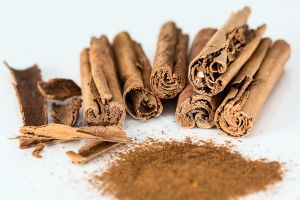The remarkable Health benefits of Cinnamon

Cinnamon is more than just a beloved spice for flavoring our favorite dishes—it’s a powerhouse of health benefits. Derived from the inner bark of trees from the Cinnamomum family, this spice has been used for centuries in both traditional medicine and culinary applications. Modern research has confirmed many of its medicinal properties, making cinnamon an excellent natural remedy with a wide range of uses.
1. Rich in Antioxidants
Cinnamon is packed with antioxidants, which play a crucial role in protecting the body from oxidative stress. Free radicals, unstable molecules that can damage cells, contribute to aging and the development of chronic diseases. Cinnamon’s antioxidants, particularly polyphenols, help neutralize these harmful molecules, reducing the risk of cell damage and slowing down the aging process. Scientific studies have identified over 40 protective compounds in cinnamon, making it one of the most potent antioxidant foods available.
2. Anti-Inflammatory Properties
Inflammation is the body’s natural response to injury or infection, but chronic inflammation can lead to various diseases, including heart disease and cancer. Cinnamon contains flavonoids, which are plant compounds known for their anti-inflammatory effects. These compounds help reduce swelling and inflammation in the body, contributing to a lower risk of chronic diseases. This anti-inflammatory effect also protects brain cells, offering potential defense against neurodegenerative diseases like Alzheimer’s and Parkinson’s.
3. Helps Manage Blood Sugar Levels
Cinnamon has shown promise in helping to control blood sugar levels, making it beneficial for people with type 2 diabetes or those at risk of developing the condition. By mimicking insulin and improving insulin sensitivity, cinnamon helps cells absorb glucose more efficiently. This results in more stable blood sugar levels, which can help prevent the dangerous spikes and drops often experienced by diabetics. Additionally, cinnamon may reduce fasting blood sugar levels and improve the body’s ability to process sugar after meals.
4. Supports Heart Health
Cinnamon plays a significant role in improving heart health. Studies have shown that regular consumption of cinnamon can lower harmful LDL cholesterol, triglycerides, and total cholesterol, while maintaining or even increasing levels of HDL cholesterol (the “good” kind). Additionally, cinnamon has been found to reduce blood pressure, improving overall cardiovascular health and reducing the risk of heart disease.
5. Fights Bacterial and Fungal Infections
Cinnamon contains powerful antibacterial, antifungal, and antiviral properties, making it a natural defense against infections. It can be used to combat fungal infections, including Candida overgrowth in the digestive system, and has been shown to inhibit bacterial growth, including bacteria that cause dental decay. Cinnamon’s essential oils, in particular, are effective in disrupting the membranes of harmful microorganisms, preventing them from thriving.
6. Enhances Brain Function
The active compounds in cinnamon may also benefit brain health. Research indicates that cinnamon can enhance cognitive function, particularly memory and learning. Its anti-inflammatory and antioxidant properties protect neurons from damage, reducing the risk of age-related mental decline. Cinnamon may also help prevent Alzheimer’s disease by inhibiting the buildup of tau proteins in the brain, which are a hallmark of the condition.
7. Promotes Respiratory Health
Cinnamon can be beneficial for respiratory health by clearing mucus and improving circulation, which helps ease symptoms of colds, bronchitis, and other respiratory conditions. This warming spice is often used in natural remedies for clearing congestion and soothing coughs. Its antibacterial properties also make it useful in reducing infections that may accompany respiratory issues.
8. May Help Fight Cancer
Cinnamon’s potential to fight cancer is an area of ongoing research. Test tube and animal studies suggest that cinnamon compounds may have anti-cancer properties, including the ability to prevent the growth and spread of cancer cells. These effects may be attributed to its antioxidant and anti-inflammatory actions, as well as its ability to target pathways involved in cell mutation and proliferation.
9. Improves Skin Health
When applied topically, cinnamon can improve skin health by reducing inflammation, redness, and infection. It’s often used in natural remedies to treat acne and skin irritations. A common combination of cinnamon and honey can create an antimicrobial paste that combats breakouts and soothes inflamed skin. The spice’s anti-inflammatory properties also help calm irritated skin, making it an excellent natural treatment for conditions like rosacea.
10. Protects Against Neurodegenerative Diseases
Cinnamon’s neuroprotective benefits go beyond Alzheimer’s disease prevention. It may also reduce the risk of Parkinson’s disease by shielding brain cells from damage. In animal studies, cinnamon has been shown to improve motor function, suggesting it could help manage some of the symptoms associated with neurodegenerative disorders.
Choosing the Right Type of Cinnamon
It’s important to know that there are two main types of cinnamon: Cassia and Ceylon. Cassia cinnamon, the most commonly used variety, contains coumarin, a compound that can be harmful in large amounts. Excessive consumption of coumarin has been linked to liver damage and other health problems. Ceylon cinnamon, known as “true cinnamon,” has significantly lower levels of coumarin, making it a safer option for regular use.
Conclusion
Cinnamon is more than a simple spice—it’s a versatile, natural remedy with a broad range of health benefits. From improving heart and brain health to fighting infections and regulating blood sugar, its effects are well-supported by both ancient wisdom and modern science. Whether you’re adding it to your morning coffee or using it as part of a holistic health routine, cinnamon can be a valuable addition to a healthy lifestyle.


Leave a Reply